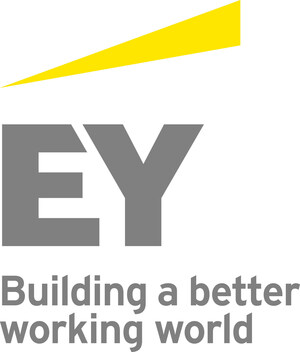- 45% of consumers surveyed actively seek respite from internet-enabled devices
- 72% are concerned about disclosing personal data, even to trusted websites
- Streaming redefines content consumption and disrupts traditional TV uptake
LONDON, Oct. 17, 2019 /PRNewswire/ -- While 54% of consumers say the internet is integral to their social lives, nearly half (45%) actively seek time away from their smartphone and other internet-enabled devices — rising to 53% among consumers aged 25-34. This is according to a global EY study, Decoding the digital home, which evaluates consumer attitudes to a range of technology, media and entertainment, and telecommunications (TMT) services within the home across four markets — France, the Netherlands, the UK and the US.
The survey indicates that take-up rates of smart-home products and services look favorable — with smart utilities seeing the best five-year adoption outlook — but a surge in connectivity now threatens to undermine consumer trust. Most respondents (72% across all markets) say they are cautious about disclosing personal data, while 41% in both the US and UK say they don't believe their data can ever be fully secure.
Adrian Baschnonga, EY Global Telecommunications Lead Analyst, says:
"Today's households are hyper-sensitive about data disclosure, which if left unchecked could frustrate the consumer Internet of Things growth story. Indeed, 43% of survey respondents are unconvinced that recent regulatory change can adequately protect their data profile. Businesses need to go beyond boilerplate statements of compliance, placing data protection at the very heart of customer interactions and the service-innovation agenda."
Complex customer journey risks alienating consumers
The survey unearths a growing sense of confusion among consumers over an increasingly complex landscape of broadband bundles. Forty-two percent of respondents in France say they find it hard to choose services or packages that suit their needs. Respondents in the UK (32%), US (30%) and the Netherlands (27%) echo this sentiment. Across all markets, nearly half (48%) of consumers say introductory offers make it difficult to understand which internet packages represent the best value.
Baschnonga says: "Complex bundles represent overkill for many households, while pricing plans are often opaque. Businesses need to help customers regain confidence by offering more transparent pricing plans, simpler packages and the information they need to understand the trade-offs between cost and value."
Meanwhile, almost a quarter of consumers in the US and UK (24% in both markets) are struggling to find their favorite content, in what they perceive to be a crowded service ecosystem. This rises to 34% in the US and 39% in the UK among 18-24-year-olds, indicating that younger consumers may not necessarily find the digital world easier to navigate.
Martyn Whistler, EY Global Media & Entertainment Lead Analyst, says:
"An ever-growing array of platforms and devices are providing new experiences for many but engaging with must-have content can be a frustrating experience — with younger consumers the most likely to struggle. Ensuring that new propositions deliver high levels of convenience should be top of mind for content providers."
Streaming services challenge traditional broadcasters
Streaming continues to redefine how households consume content, according to the survey. Nearly a third (32%) of respondents are progressing to multiple-device streaming behaviors, while 57% say their household watches short video clips online. This behavioral shift is more advanced in the US, where just 38% favor traditional TV channels, compared with 51% in the UK and 67% in the Netherlands.
Whistler says: "Households in all markets are progressing at different speeds toward their digital future, and consumers' needs are becoming increasingly nuanced and divergent. Service providers must look to reflect these widely varying attitudes in more targeted offerings. And as partnerships become more important to service creation and distribution, wider engagement with stakeholders should also be top of mind."
Notes to editors
About EY
EY is a global leader in assurance, tax, transaction and advisory services. The insights and quality services we deliver help build trust and confidence in the capital markets and in economies the world over. We develop outstanding leaders who team to deliver on our promises to all of our stakeholders. In so doing, we play a critical role in building a better working world for our people, for our clients and for our communities.
EY refers to the global organization, and may refer to one or more, of the member firms of Ernst & Young Global Limited, each of which is a separate legal entity. Ernst & Young Global Limited, a UK company limited by guarantee, does not provide services to clients. Information about how EY collects and uses personal data and a description of the rights individuals have under data protection legislation is available via ey.com/privacy. For more information about our organization, please visit ey.com.
This news release has been issued by EYGM Limited, a member of the global EY organization that also does not provide any services to clients.
About the study
Decoding the digital home is a study of consumers' attitudes toward a range of technology, media and entertainment, and telecommunications (TMT) services in the home. The insights were generated through an online survey of 12,500 broadband households between October and December 2018 across four markets — France, the Netherlands, the UK and the US. The survey questionnaire consisted of 54 attitudinal questions. Additional analysis and insights have been provided by EY TMT teams.
Michael Curtis
EY Global Media Relations
+44 (0)207 980 0454
michael.curtis@uk.ey.com
Logo - https://mma.prnewswire.com/media/708904/EY_Logo.jpg






Share this article